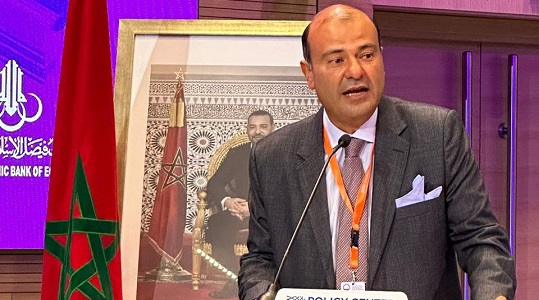The Secretary-General of the Union of Arab Chambers, Dr. Khaled Hanafi, confirmed during his participation in the work of the 18th Scientific Conference of the Arab Association for Economic Research, under the title "The Future of Arab Economies: Imposed Disruptions and Desired Reforms", which was held at the Policy Center for the New South - Mohammed VI Polytechnic University, Rabat - Kingdom of Morocco, during the period 28-29 November, 2024, with the participation of prominent economic and official figures, led by the Executive Director of the Policy Center for the New South Karim El Aynaoui, Moroccan Minister Delegate in charge of Budget Faouzi Lekjaa, Chairman of the Board of Directors of the Arab Association for Economic Research Mahmoud Mohieddine Director General of the Arab Planning Institute Abdullah Fahd Al-Shami, Secretary-General of the Arab Association for Economic Research, and General Coordinator of the Conference, Dr. Ashraf El-Araby, Dr. Gehan Saleh, Advisor to the Egyptian Prime Minister, Dr. Sarah El-Gazzar, Economic Advisor at the Union of Arab Chambers, Dr. Joud Abdel Khaleq, former Minister of Supply and Internal Trade in the Arab Republic of Egypt, Dr. Naglaa Al-Ahwani, former Minister of International Cooperation in the Arab Republic of Egypt, that Economic diversification has become an urgent strategic goal for Arab countries, given the increasing challenges facing their economies, which are largely dependent on limited sectors, most notably oil and natural resources.
He pointed out that changes in global markets and fluctuations in energy prices, along with the acceleration of technological developments, require the countries of the region to reconsider their economic policies and adopt long-term strategies aimed at building diversified and sustainable economies capable of resilience to crises and meeting the aspirations of current and future generations. He stressed that achieving economic diversification requires an integrated system of policies that address human development, financial integration, and energy transition in a coherent manner, as sustainable results cannot be achieved in one area without integration with the other.
The Secretary-General noted that human development is one of the most important elements of economic diversification, as human capital is the crucial element in supporting innovation, raising productivity, and developing new economic sectors. To achieve this, countries must invest in quality education and vocational training that keeps pace with market needs and equips the workforce to deal with developments in the global economy. Trained cadres have the ability to lead new projects in multiple fields, such as technology, scientific research, and entrepreneurship, which enhances the role of human resources as one of the main drivers of economic diversification.
He explained that the financial sector is a vital means to drive economic diversification by providing the necessary financing for development and innovative projects. From this standpoint, the development of financial markets and the provision of a stable investment environment contribute to enhancing the private sector's ability to grow and invest in non-traditional sectors. Financial integration, through cooperation between banks, capital markets, and funds, enhances the stability of the economic system and creates broader financing opportunities for SMEs, which play an important role in the development of local economies and the expansion of the diversification base.
He said that the energy transition is a strategic axis in achieving economic diversification and sustainability, as Arab countries seek to reduce their dependence on traditional energy sources and direct their investments towards renewable energy, such as solar and wind energy. This transformation is a promising opportunity to achieve sustainable economic growth and reduce the region's carbon footprint, enhancing the ability of countries to attract foreign investment and multinational companies interested in environmental sustainability. In addition, the energy transition can contribute to reducing operational costs and creating new jobs in clean energy sectors.
He pointed to the importance of integration between human development, financial integration, and energy transition as interrelated elements that support each other to achieve a comprehensive vision of economic diversification. Countries invest in human capital and create a qualified workforce that leads innovation and project development in renewable energy, which in turn needs flexible and stable financial markets that provide financing for large and small projects alike. In this context, this session seeks to discuss the different dimensions of economic diversification through realistic studies and models and to provide recommendations on policies and practical measures that Arab countries can adopt to enhance their march towards a more diversified and resilient economy.
The results suggest that financial development supports economic diversification but in a non-linear form, where significant benefits begin to emerge after exceeding certain levels of financial maturity. Government spending also enhances the positive impact of financial development. The study concluded that fiscal reforms must be sustainable and targeted, especially in countries with less developed financial systems, to promote long-term diversification.
He called for reducing dependence on oil and building more resilient economies through strategies that include improving financial infrastructure, encouraging innovation, and expanding access to financial services, which supports SMEs in non-oil sectors.
He noted the need to improve access to clean energy, motivate families to transition from traditional fuels to clean energy, strengthen integrated health services, enhance disaster preparedness, and seek regional cooperation and international support.
He stressed that educational reform is the need to adopt modern educational methods that promote critical thinking and keep pace with the needs of a diversified economy. Strengthening governance also contributes to improving governance indicators and reducing corruption, as good governance has been shown to increase the chances of success of diversification. While adopting policies that encourage the development of non-oil sectors such as technology, tourism, and manufacturing, ensures the sustainability of economic growth.
On the sidelines of the 18th Scientific Conference of the Arab Society for Economic Research, a cooperation agreement was signed between the Union of Arab Chambers, represented by the Secretary-General of the Union, Dr. Khaled Hanafi, and the Islamic World Educational, Scientific and Cultural Organization (ISESCO), in order to enhance cooperation between the two sides to raise the level of development in the Arab and Islamic world.
Source (Union of Arab Chambers)

